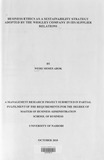| dc.description.abstract | The study set out to address two objectives namely; to determine the nature of business ethics practices by the Wrigley's suppliers in Kenya, and secondly to establish the level of the suppliers' readiness to comply with the Wrigley's Supplier Code of Conduct and compliance program. The data that were analysed were gathered using a semi-structured questionnaire targeting Chief Executive Officers of the targeted Wrigley Company suppliers. Out of the twelve targeted companies, only nine filled and returned the questionnaire. This formed 75% response rate which was considered suitable for analysis.
To achieve the study objectives, primary data was collected through a census survey. A survey was chosen because the researcher's aim was to get comparable data from across the study units to facilitate comparison (Cooper & Schindler, 2006). Frequencies and percentages were used to describe the most dominant business ethics practices adopted and challenges experienced by the respondents. In both cases, mean scores were used to depict the relative potency and standard deviation was used to measure the degree of variation in the scores of particular policies and the challenges experienced across the firms.
In determining whether a policy is adopted and challenge experienced or not across the board, the study adopted the use of mean scores. A mean score of less than 3.0 indicated that a particular policy was not adopted or challenge not experienced by a majority of the firms participated in the study. A mean score of3.1 - 3.9 means adoption or experienced to a large extent and the one with a mean score of 4.0 and above indicated a very large extent of adoption or experience across the board.
Research findings with respect to the first objective established that a number of business ethics practices had been adopted by the firms in their business processes. Out of the ten policies on business ethics, seven were adopted to a very large extent across the board. This represented an adoption rate of 70% of the policies that were under study. These include policies on fair and equal treatment of employees (mean score: 4.22), against child labor (mean score: 4.67), compensation to employees (mean score: 4.33), health and safety at work place (mean score: 4.33), freedom of association (mean score: 4.33), environmental protection (mean score: 4.56) and compliance with applicable laws (mean score 4.22). Ferrell et al. (2008) support the findings of the study by asserting that concern for issues such as ethics in business, emerging business ethics issues, stakeholder relationships, institutionalization of business ethics, social responsibility and corporate governance, developing effective ethics program, corporate culture, implementing and auditing the ethics program, and global business ethics will continue to be prominent moving into the future. Research findings with respect to the second objective of the study established that two challenges were experienced to a very large extent.
These include high employee turnover ( mean score: 4.56) and inadequate understanding of the business ethics concept (mean score: 4.56). High levels of corruption in the country (mean score: 3.89) was experienced to a large extent. The uniqueness of the challenges associated with each organisation depicts the relationship between the opposing views advanced in the arguments for and against business ethics. Ansoff and McDonnell (1990) acknowledge that the societal predicament is complex and multifaceted and requires appropriately complex, multifaceted and aggressive response strategies if private capitalism is to continue to play an effective role in future society. They further assert that management must approach its societal challenges with the same foresight, and in the same methodical and deliberate way in which it approaches commercial challenges.
It was, however, noted that in both the first and second objectives there were variations among respondents with respect to the degree to which the business ethics practices were adopted and implementation challenges experienced among the Wrigley company suppliers. The findings were in agreement with the various arguments presented in the literature review on strategy and business ethics concepts. Based on the fmdings, it is recommended that for the Wrigley Company to benefit from business ethics a powerful strategy for sustainability of brand reputation, it should conduct specific awareness training programs for each supplier. This will ensure uniqueness of individual suppliers are addressed and success of the Supplier Code of Conduct and compliance program. The training program should help the organizations to practise the policies put in place and devise ways of overcoming the challenges experienced in implementing the business ethics requirements. | en_US |

